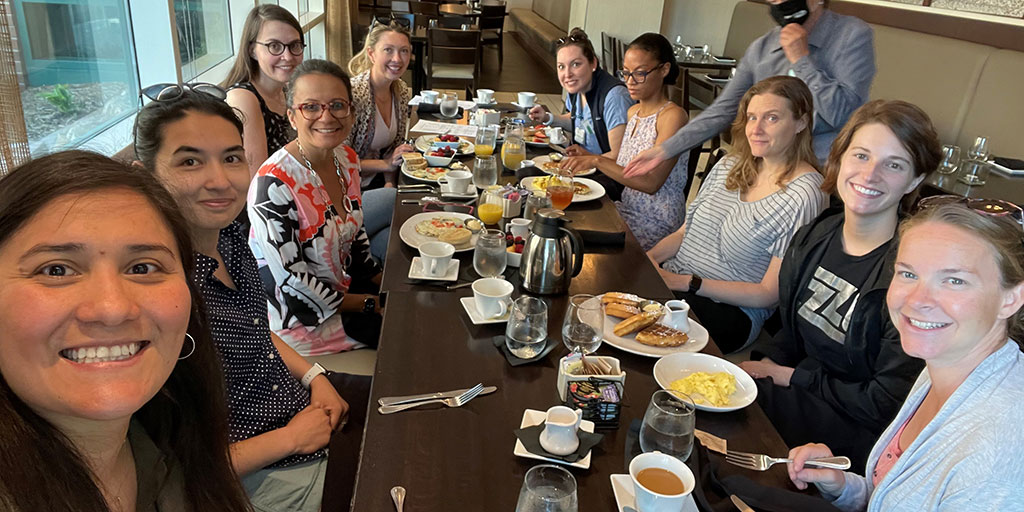Being a female emergency medicine (EM) physician comes with unique challenges. Created and led by Drs. Raukar and Walker, the Women in EM program capitalizes on existing resources and talents to create a supportive program that advances women. Our approach focuses on mentoring, education, and resident/faculty development and helps to advance both the practice of emergency medicine and research within the space. The objective of this group is to create a group of women in Emergency Medicine who work together to build clinical knowledge, bolster research productivity, create career opportunities for themselves and their colleagues, encourage resident leaders, and improve faculty and resident satisfaction.
Mentoring
One of the arms of the program is mentoring through both formal and informal opportunities that allow for intergenerational and multisite exchange.
Education
Accomplished through both casual gatherings with guest speakers and formal lectures, such as sponsored Grand Rounds offerings.
Resident and faculty development
During our monthly meetings, there is a curriculum of leadership development. We address common concerns such as: finding a niche; identifying and overcoming imposter syndrome; public speaking; gendered leadership; negotiation skills; and navigating professional relationships. We also explore more practical matters such as lactation, childcare, and the ever-elusive "work-life balance.” Because progress cannot be made without understanding and allies, and because many of these issues are not exclusive to women, three to four times a year, we invite the men to join our meeting and share their experiences.
Research
In 2014, the Academic Emergency Medicine (AEM) Consensus Conference discussed Gender-Specific Research in Emergency Care—Investigate, Understand, and Translate How Sex/Gender Affects Patient Outcomes. As a member of this committee, Dr. Raukar worked with researchers, clinicians, health care providers, patients, and representatives of federal agencies and policy makers to put forth a map for future research in EM. As a leader in sex- and gender-based research, she uses existing research resources and expertise to serve as a resource for trainees and faculty members conducting sex- and gender-based research both locally and nationally. The research division, directed by Drs. Bellolio, Campbell and Jeffery conduct research in several different topics related to acute care and lend their expertise towards this goal of inclusive research.

Practice
The awareness of the unique needs of women in the clinical setting catalyzed the creation of a wellness space within the walls of the department, where new mothers have a peaceful alcove to lactate during a shift. The creation of a policy within our residency program clarifies that residents are encouraged to take pumping breaks as needed — in coordination with clinical teams so as not to compromise patient care — and communicate support from supervisors. In conjunction with an informal peer mentoring program, residents with the experience of pumping at work pair up with newer trainees. The policy normalizes lactation and empowers trainees by diminishing the need to ask for individual accommodations.

We have an emphasis on allyship for each other and have a separate track for our male colleagues (under the leadership of Dr. Alex Finch) where men learn to be champions for women at work and help create a supportive, inclusive environment powered by understanding and empathy.
These goals are accomplished through a series of department funded, scheduled events. Creation of a safe environment allows for open dialogue and offers real time support while advancing each arm of the objectives.
Through this framework of mentoring, education, and leadership development, we are creating future leaders in Emergency Medicine.
/prod01/channel_2/media/mccms/content-assets/academics/residencies-and-fellowships/emergency-medicine-residency-minnesota/size-512X512_Neha-Raukar,-M.D.,-M.S.-14010364_201809060315.jpg)
/prod01/channel_2/media/mccms/content-assets/academics/residencies-and-fellowships/emergency-medicine-residency-minnesota/size-1024X512_women-in-EM-heading-pic.jpg)


/prod01/channel_2/media/mccms/content-assets/academics/residencies-and-fellowships/emergency-medicine-residency-minnesota/size-512X512_Laura-Walker,-M.D.-15078272_201707270401.jpg)